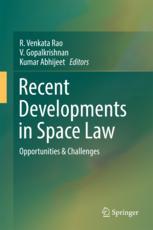

Most ebook files are in PDF format, so you can easily read them using various software such as Foxit Reader or directly on the Google Chrome browser.
Some ebook files are released by publishers in other formats such as .awz, .mobi, .epub, .fb2, etc. You may need to install specific software to read these formats on mobile/PC, such as Calibre.
Please read the tutorial at this link: https://ebookbell.com/faq
We offer FREE conversion to the popular formats you request; however, this may take some time. Therefore, right after payment, please email us, and we will try to provide the service as quickly as possible.
For some exceptional file formats or broken links (if any), please refrain from opening any disputes. Instead, email us first, and we will try to assist within a maximum of 6 hours.
EbookBell Team

4.1
80 reviewsThis book offers a compendium of diverse essays on emerging legal issues in outer space, written by experts in the field of Space Law from different parts of the globe. The book comprehensively addresses opportunities in space and the inevitable legal challenges that these space activities pose for mankind. It explores the increasing role of private sector in outer space, which calls for a review of policy and legislation; invites opinio juris from law scholars for ensuring the applicability of the Outer Space Treaty on all states without ratification and universal abidance with Space Law without demur; reflects upon the challenges for the global space community involved in implementing a more effective approach to international space governance; and considers the use of domestic laws, and the consequent need for legal reform, to encourage broader engagement with commercial space innovation. Further, the book delves into the adequacy of existing international liability regime to protect space tourists in the event of a space vehicle accidents; examines the increasing use of space for military activities and canvasses how International Law may apply to condition behaviour; highlights the challenges of scavenging space debris; calls for protections of space assets; touches upon the legal regime pertaining to ASAT and discusses other ways of creating normative instruments, which also come from other areas and use other methods.
Given its comprehensive coverage of opportunities in space and the inevitable legal challenges that they pose, the book offers a valuable resource for students, researchers, academics and professionals including government officials, industry executives, specialists, and lawyers, helping them understand essential contemporary issues and developments in Space Law.